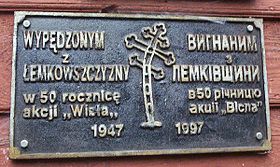Operation Vistula

Inscription in Polish and Ukrainian at a church in Beskid Niski, Poland: "In memory of those expelled from Lemkivshchyna, on the 50th anniversary of 'Operation Vistula,' 1947-1997."
|
|
| Native name | Akcja "Wisła" |
|---|---|
| Time | 28 April – 31 July 1947 |
| Location | Bieszczady and Low Beskids |
| Type | Resettlement |
| Cause | UPA massacres of Poles, Communist policy of ethnic homogenization |
| Organised by | Polish and Soviet governments, NKVD, MBP |
| Participants | Polish United Workers' Party, Polish People's Army, and the Internal Security Corps |
| Outcome | Deportation of 141,000 civilians to the Recovered Territories |
Operation Vistula (Polish: Akcja "Wisła") was a codename for the 1947 forced resettlement of Ukrainian minority including Boykos and Lemkos from the south-eastern provinces of post-war Poland, to the Recovered Territories in the west of the country. The action was carried out by the Soviet-installed Polish communist authorities with the aim of removing material support and assistance to the Ukrainian Insurgent Army. The Ukrainian Insurgent Army continued to fight until 1947 in both Subcarpathian and Lublin Voivodeships with no hope for any peaceful resolution. Operation Vistula effectively brought an end to the hostilities.
In three months beginning April 28, 1947 with the Soviet approval and aid, about 141,000 civilians residing around Bieszczady and Low Beskids were forcibly resettled to formerly German territories, ceded to Poland at the Yalta Conference at the end of World War II. The operation was named after the Vistula River, Wisła in Polish. Some Polish and Ukrainian politicians as well as historians condemned the operation following the 1989 fall of communism in Eastern Europe, and described it as ethnic cleansing. Others pointed out that no other means of stopping the violence existed at the time since partisans used to regroup outside the Polish borders.
...
Wikipedia
